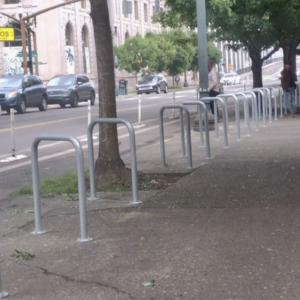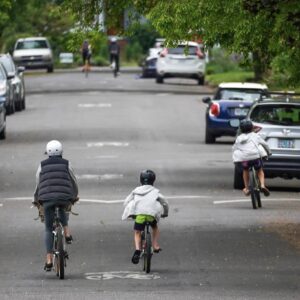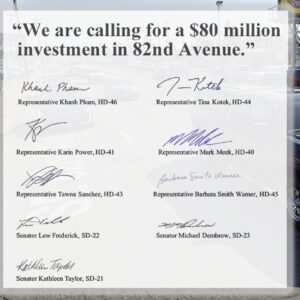“The heart of the issue is that what the biking interests apparently saw in the comments… was a group of DOTs that have no interest in supporting biking concerns. That’s just not the case. That was not the intent. AASHTO has not backed away from its support of the law and the bicycling community.”
— Lloyd Brown, AASHTO
The American Association for State Highway Transportation Officials (AASHTO) issued a statement today saying they would withdraw their request to dial back newly proposed regulations by the Federal Highway Administration that seeks to strengthen non-motorized transportation policy.
AASHTO’s request drew ire from bicycling and walking advocacy groups, state DOT directors (including Oregon’s Matthew Garrett), and even, apparently, their own Board of Directors (who felt they were not adequately briefed on the matter).
Here’s an excerpt from the statement (read it in full here):
“In response to the concerns expressed by several members of AASHTO’s Board of Directors, President Martinovich has directed AASHTO for the time being to withdraw its request that FHWA rescind its guidance on the meaning of “due consideration” of bicycle and pedestrian needs.”
AASHTO — which represents state DOTs in all 50 states — says they will now take time to more fully brief their Board and member DOTs. They have also announced a meeting with advocacy groups on May 19th to discuss the issue.
In a phone interview on Tuesday, AASHTO Director John Horsley told BikePortland he felt the newly proposed policy language fit into the “excessively burdensome” category of regulations that President Obama has told all agencies to cut.
In our interview, Horsley maintained that his stance had nothing to do with a lack of support for non-motorized transportation; he said it’s simply a matter of the extra work states would have to do to prove they cannot accomodate bicycling and walking in a project:
“We have not said in any way, shape or form that we have a quarrel with the requirement that says you have to give due consideration where appropriate; but because of the way the federal highways guidance came out… States now have to spend a lot of time doing paperwork explaining where the facility improvement is not appropriate… To explain that it would be highly costly or that it’s just not practical.”
Horsley said in many rural areas, making states pay for bicycling and walking facilities — and/or requiring them to explain to the FHWA why they can’t do them — doesn’t make fiscal or operational sense.
“This guidance [from the FHWA] is not practical or feasible,” he said, “While helpful to the bike community, it creates a burden on states that we feel fits into the President’s category of “excessively burdensome”… It forces you to justify the facilities even where it’s not appropriate.”
State DOTs already can’t afford bicycling and walking improvements Horsley said, so having to submit paperwork to the US DOT spelling that out would be a burden. “You shouldn’t be forced to do needless paperwork to justify why you can’t afford things you can’t afford to do,” is how he put it.
“When our members tell us a regulation defies common sense, and it does, we want to tell federal highways, improve your guidance.”
When I explained that a growing movement of people feel that all projects should be built as “complete streets,” Horsley said that, “as desirable the objective of complete streets is,” due to budget cuts that are making even basic services hard to provide, “It’s no longer financially possible to do some of these improvements… Even though they are are highly desirable.”
Lloyd Brown, a media spokesperson for AASHTO said that bike advocates misunderstood his organization’s stance on the issue. He wrote to us via email:
“… the heart of the issue is that what the biking interests apparently saw in the comments AASHTO submitted regarding regulations was a group of DOTs that have no interest in supporting biking concerns. That’s just not the case. That was not the intent. AASHTO has not backed away from its support of the law and the bicycling community.”
This debate has put a spotlight on the usually obscure topic of federal transportation policy language. It will be interesting to see what results from the May meeting with advocacy groups and whether or not the USDOT/FHWA ultimately succeeds in passing new policy language designed for “mainstreaming non-motorized transportation.”
It’s important to note that AASHTO’s statement doesn’t say they are giving up on their stance, simply that they are withdrawing it for now. Given Horsley’s comments, I think we’re up for more debate. Stay tuned.
— Read AASHTO’s statement in full here.





Great news! Thanks to the several thousand people who asked their DOTs to urge AASHTO to withdraw their request. You made your voices heard and it made a difference!
Thanks for the update, Jonathan. We will continue to work with AASHTO and also continue to push them to do the right thing for biking and walking.
great news to head into the weekend with… it’s a good news day for me today…
years ago they threw around that “excessively burdensome” thing with the ADA requirements, but it still passed for the greater mobility of all citizens… this seems on par with that…
Just make sure the shoulders of new and expanded highways (and freeways) are open to cycling, particularly in rural areas. No additional infrastructure necessary. Not necessarily the most attractive method of accommodation, but you can’t beat the cost.
I know how they can save money!!! Stop building so many car only roads. Hell bike and ped infrastructure is so cheap in comparison that building just that would probably save us more money upfront AND in the long run!
Dear State DOTs:
If you can’t afford to install bike/ped facilities on your new roads, you can’t afford to build new roads. Figure it out, that’s what they pay you the big bucks for.
In Portland we have many miles of roads that have not ever been paved let alone sidwalks, curbs, bike lanes.
If they can’t afford to install bike lanes or sidewalks and/or they are not needed in some remote locale, then why is any amount of paperwork burdensome? Seems to me a little bit of explanation as to why they can’t do it is far, far cheaper than designing and installing the facilities. The real reason is that it would be burdensome to come up with an explanation that sufficiently disguises their biases against alternate modes of transportation.
In the past I’ve seen the way that WSDOT designers hate to have to meet with bicycle groups and get very argumentative if you question their design in regards to bicycles. I will say they have become more open in recent years, however.
Thank you ODOT and all other state transportation officials that steered their organization back to the present.
Ted Buehler